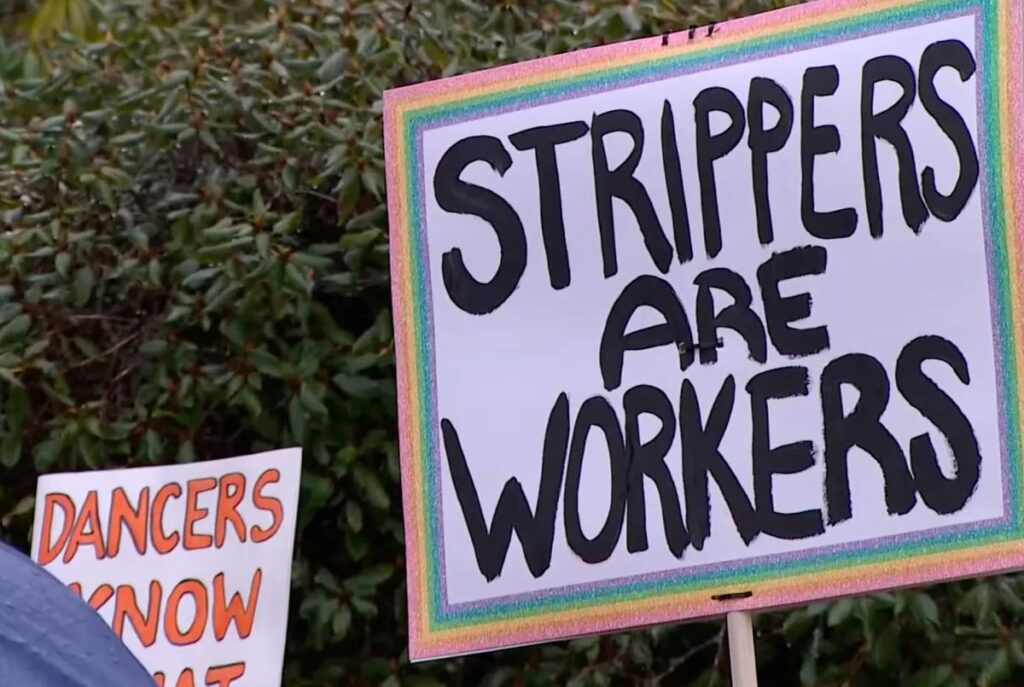
Members of the LGBTQ+ community and advocates for workers’ rights joined forces at the Washington State Capitol recently to voice support for a bill aimed at improving conditions in strip clubs. The proposed legislation, Senate Bill 6105, not only seeks to enhance working conditions but also aims to eliminate the controversial statewide lewd conduct regulation, which was at the center of last month’s contentious raids on several Seattle gay bars.
Referred to as the “Strippers’ Bill of Rights,” the bill seeks to impose restrictions on the fees charged by strip clubs to dancers, abolish local regulations dictating the distance between dancers and patrons, and mandate security staffing and conflict de-escalation training for dancers to prevent incidents such as sex trafficking.
“This marks a significant win for the LGBTQ+ community and spaces that promote queer self-expression,” remarked one advocate. Earlier in the month, Senator Jamie Pedersen, an openly gay majority floor leader representing Seattle, introduced an amendment to S.B. 6105 aimed at repealing a section of the state code prohibiting “lewd conduct” in venues serving alcohol.
This regulation, enforced by the Washington State Liquor and Cannabis Board (LCB), served as the legal basis for the raids conducted by the LCB and the City of Seattle Joint Enforcement Team (JET) on several LGBTQ+ venues in Seattle the previous month.
ALSO READ: Court Backs Christian Photographer, Rules He Can Refuse LGBTQ+ Couples
Joey Burgess, the owner of Queer Bar and Cuff, said enforcement of these archaic laws had been a historical problem with JET and the LCB for beyond a decade. The raid scared his staff, who felt they had been investigated for a crime they had not committed. He said his other business, Oddfellows, has never been treated like his gay bars.
In a statement on the Senate floor, Pedersen expressed surprise at the continued enforcement of these regulations, deeming the raids on Seattle bars as reminiscent of a bygone era. The amendment was successfully incorporated into the bill, which passed with a vote of 29–20 on February 7.
POLL — Should Laws Be Enacted To Protect LGBTQ+ Individuals From Workplace Discrimination?
Despite this initial success, the bill faces opposition from state House lawmakers, as the Oregon Capital Chronicle reported. The state’s ban on “lewd conduct” in venues serving alcohol poses a barrier to strip clubs obtaining liquor licenses.
Pedersen’s amendment addresses this by creating a pathway for liquor sales in strip clubs. However, House Speaker Laurie Jinkins has indicated that she will not endorse the bill if it includes provisions for liquor sales in strip clubs.
Advocates for Pedersen’s amendment argue that legalizing liquor sales in strip clubs would alleviate financial pressures on dancers by increasing revenue. Some dancers who gathered at the state Capitol emphasized that the existing prohibition does little to protect strippers, mainly when patrons arrive at clubs already intoxicated.
ALSO READ: Florida GOP Proposes Grooming Bans Amid Multiple Anti-LGBTQ Bills
One stripper interviewed by the Chronicle highlighted how the state’s “lewd conduct” regulations contribute to the stigmatization of sex work and the LGBTQ+ community.
“Picture yourself spending time with friends, dancing, enjoying music, appreciating art and beauty—only to be interrupted by armed agents storming in, photographing your friends, shining flashlights on your body,” said Chad Swaney, a protester. “This is simply unacceptable.
You Might Also Like:
Court Sentences Alaska Woman to 99 Years for Killing Friend in $9 Million Murder-for-Hire Scheme
Denver Grapples With Budget Cuts as Recreational Centers Reduce Hours Amid Migrant Crisis
School District Pulls Substitute Teacher From Elementary Over Inappropriate Image Allegations
Gun Kit Manufacturer to Pay Baltimore $1.2 Million in Settlement Over Increasing Violence
Judge Sentences Chicago Man to Life in Prison for Killing His Kids
